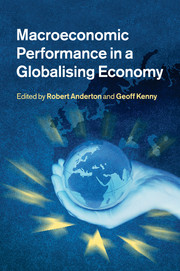Book contents
- Frontmatter
- Contents
- List of figures
- List of tables
- Notes on contributors
- Foreword by Jürgen Stark
- Acknowledgements
- 1 Globalisation and macroeconomic performance
- 2 The impact of globalisation on the euro area macroeconomy
- 3 Trade and foreign direct investment in business services: a modelling approach
- 4 Entry dynamics and the decline in exchange-rate pass-through
- 5 Does the exchange rate belong in monetary policy rules? New answers from a DSGE model with endogenous tradability and trade frictions
- 6 Globalisation and inflation in the OECD economies
- 7 Globalisation and euro area prices and labour markets: some evidence on the impact of low-cost countries
- 8 Monetary policy strategy in a global environment
- 9 Monetary policy in a global economy: past and future research challenges
- Index
9 - Monetary policy in a global economy: past and future research challenges
Published online by Cambridge University Press: 04 February 2011
- Frontmatter
- Contents
- List of figures
- List of tables
- Notes on contributors
- Foreword by Jürgen Stark
- Acknowledgements
- 1 Globalisation and macroeconomic performance
- 2 The impact of globalisation on the euro area macroeconomy
- 3 Trade and foreign direct investment in business services: a modelling approach
- 4 Entry dynamics and the decline in exchange-rate pass-through
- 5 Does the exchange rate belong in monetary policy rules? New answers from a DSGE model with endogenous tradability and trade frictions
- 6 Globalisation and inflation in the OECD economies
- 7 Globalisation and euro area prices and labour markets: some evidence on the impact of low-cost countries
- 8 Monetary policy strategy in a global environment
- 9 Monetary policy in a global economy: past and future research challenges
- Index
Summary
In these brief remarks I want to discuss the role of economic research in dealing with the enormous economic policy challenges of globalisation. I believe we can learn much by reviewing how researchers in the past dealt with difficult policy problems and how they successfully solved them.
Let me start out by recalling the challenges that policy makers, and especially central bankers, faced in the wake of the demise of the Bretton Woods system in the 1970s. High and volatile inflation, frequent recessions and very volatile output were plaguing the USA and most other industrial countries. For example, US inflation hit 12 per cent in 1975, fell to 5 per cent in 1977 and then increased to 15 per cent in 1979. The standard deviation of real GDP growth was large at 2.8 per cent in the United States and 2.7 per cent on average in the G7. Many observers were criticising the performance of policy makers.
However, research in monetary economics rose to the challenge, forcefully arguing that inflation stabilisation should be the paramount concern of monetary policy and deriving optimal monetary policy rules in models putting rational expectations and the Lucas critique at their core for the first time, but without assuming away real effects of money.
The consequences of this dramatic shift in the theory apparently led to shifts in the practice of monetary policy; the resulting change in economic performance was momentous.
- Type
- Chapter
- Information
- Macroeconomic Performance in a Globalising Economy , pp. 269 - 272Publisher: Cambridge University PressPrint publication year: 2010



